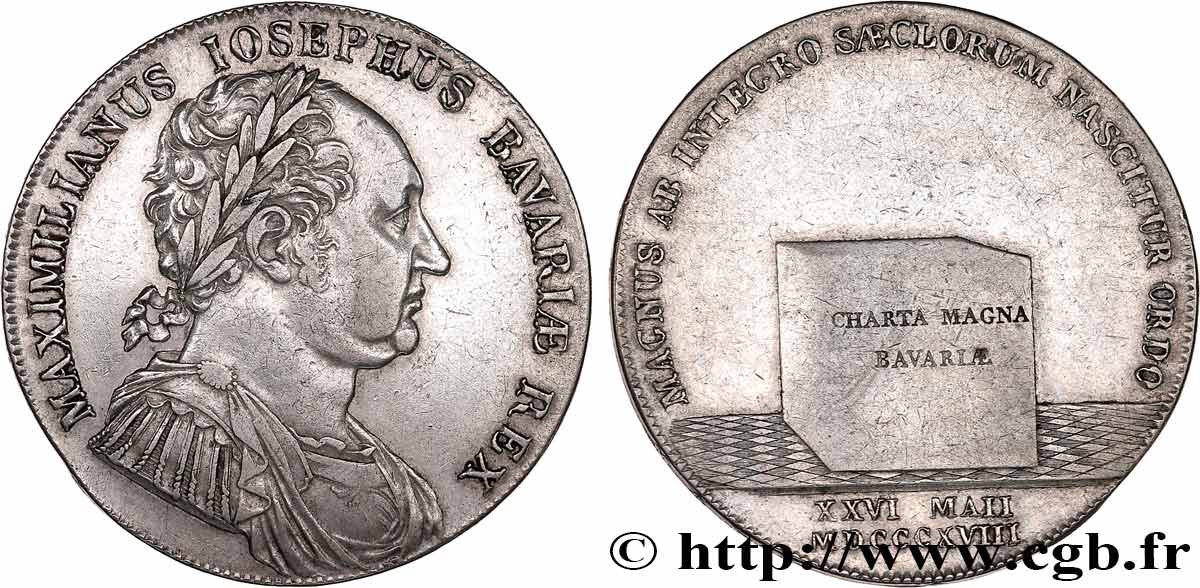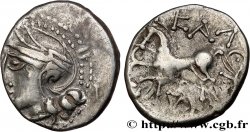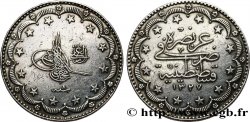fwo_767659 - GERMANIA - REGNO DI BAVIERA - MASSIMILIANI I GIUSEPPE Thaler de convention 1818 Münich
non disponibile.
Articolo venduto sul nostro negozio (2022)
Prezzo : 220.00 €
Articolo venduto sul nostro negozio (2022)
Prezzo : 220.00 €
Tipo : Thaler de convention
Data: 1818
Nome della officina / città: Münich
Quantità coniata : 40000
Metallo : argento (placcato)
Titolo in millesimi : 868 ‰
Diametro : 40 mm
Asse di coniazione : 12 h.
Peso : 27,84 g.
Orlo : en relief : * ZEHEN EINE FEINE MARK *
Grado di rarità : R1
Commenti sullo stato di conservazione:
La monnaie a été nettoyée
N° nelle opere di riferimento :
Diritto
Titolatura diritto : MAXIMILIANUS IOSEPHUS BAVARIAE REX.
Descrittivo diritto : Buste de Maximilien-Joseph à droite en tenue d’empereur romain.
Traduzione diritto : (Maximilien-Joseph roi de Bavière).
Rovescio
Titolatura rovescio : MAGNUS AB INTEGRO SAECLORUM NASCITUR ORDO/ XXVI MAII/ MDCCCXVIII.
Descrittivo rovescio : Inscription sur pierre taillée (symbole maçonnique) sur deux lignes CHARTA MAGNA/ BAVARIAE posée sur un terrain quadrillé.
Traduzione rovescio : (Le grand ordre des siècles naît sur de nouvelles bases/ 26 MAI/ 1818).
Commento
La légende du revers (magnus ab integro saeclorum nascitur ordo) reprend le cinquième vers de la quatrième églogue (ou Bucolique) de Virgile, un des textes les plus connus de Virgile et ayant été traduit en vers français notamment par Paul Valery. Dans le texte, Virgile annonce un retour imminent de l'âge d'or. Son avènement est lié à la naissance d'un enfant. Ici l’enfant est de toute évidence la nouvelle constitution bavaroise de 1818. Elle consacre notamment, pour la première fois, l'égalité de tous les hommes devant la loi, le droit à la propriété, la liberté de la personne, la liberté de conscience et l'indépendance des juges. Elle est considérée comme étant le fondement de la vie parlementaire et démocratique en Bavière.
The legend on the reverse (magnus ab integro saeclorum nascitur ordo) takes up the fifth verse of Virgil's fourth eclogue (or Bucolic), one of Virgil's best-known texts and having been translated into French verse notably by Paul Valery. In the text, Virgil announces an imminent return of the golden age. Its advent is linked to the birth of a child. Here the child is clearly the new Bavarian constitution of 1818. It enshrines, in particular, for the first time, the equality of all men before the law, the right to property, personal liberty, freedom of conscience and the independence of judges. It is considered to be the foundation of parliamentary and democratic life in Bavaria.
The legend on the reverse (magnus ab integro saeclorum nascitur ordo) takes up the fifth verse of Virgil's fourth eclogue (or Bucolic), one of Virgil's best-known texts and having been translated into French verse notably by Paul Valery. In the text, Virgil announces an imminent return of the golden age. Its advent is linked to the birth of a child. Here the child is clearly the new Bavarian constitution of 1818. It enshrines, in particular, for the first time, the equality of all men before the law, the right to property, personal liberty, freedom of conscience and the independence of judges. It is considered to be the foundation of parliamentary and democratic life in Bavaria.








 Segnalare un errore
Segnalare un errore Stampate la pagina
Stampate la pagina Condividi mia selezione
Condividi mia selezione Fai una domanda
Fai una domanda Consegnare / vendere
Consegnare / vendere







